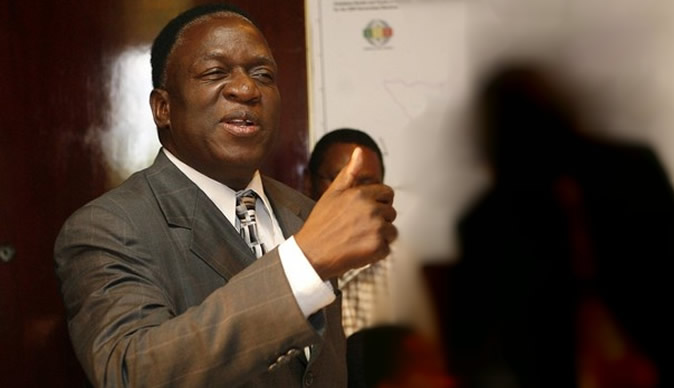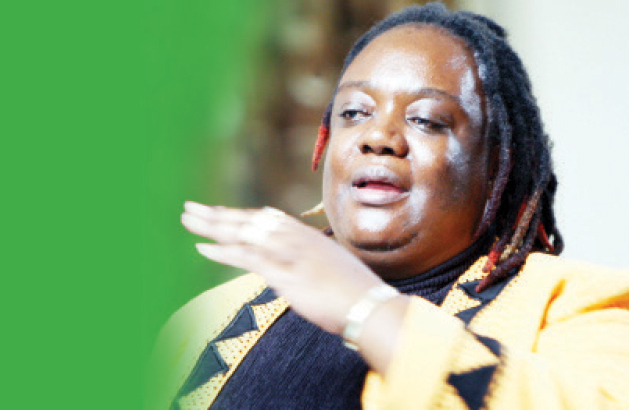VP Mnangagwa alludes to indigenisation law overhaul

Tendai Mugabe Harare Bureau
Acting President Emmerson Mnangagwa says the government will early next year pronounce new business policies aimed at relaxing indigenisation laws and promoting Foreign Direct Investment into the country.
Cde Mnangagwa told businesspeople who paid him a courtesy call at his farm in Kwekwe at the weekend that the government would also get rid of bureaucratic regulations that inconvenienced prospective investors.
Several captains of industry that included Zesa Holdings group chief executive Engineer Josh Chifamba, Affirmative Action Group acting chief executive Davison Gomo, Lasch co-director Nelson Mahupete and Zimbabwe Power Company managing director Engineer Noah Gwariro, were among the top business executives that attended the highly subscribed meeting.
The business people took the opportunity to present challenges confronting the national economy and proposed plausible remedies to some of the problems.
Cde Mnangagwa said it was important to deal urgently with issues affecting business to put the economy back on the rails.
“Next year when both industry and commerce come back to work, we should be pronouncing new policies that are more biased towards relaxation. That’s what I can say at this stage,” he said.
“In the budget statement Finance and Economic Development Minister (Patrick) Chinamasa said he was going to re-examine the issue of indigenisation. I don’t know what’s going to come out of that revisit but we believe it’s to make investors more comfortable and make investment easy.
“The question of investors coming here and spend six months consulting isn’t good. We also need to find out sector by sector how fast we can structure consultation procedures in those areas.”
Cde Mnangagwa said in other countries investment formalities took less than a month.
In this regard, Cde Mnangagwa said the government would make efforts to simplify and expedite investment formalities.
“If an investor comes here he’s told to see Minister of Justice and after that he sees Minister of Tourism, thereafter he sees Minister of Water and he’s asked to see (Kembo) Mohadi and is told he’s not around, he later goes to seek Chidakwa (Walter) (Mines and Mining Development Minister),” he said.
“All those things should be a thing of the past.”
Cde Mnangagwa said the illegal sanctions that constrained the economy were largely removed and the Bretton Woods institutions were slowly appreciating the new environment in the country.
“We believe that by this time next year we’d have secured more lines of credit,” he said.
Cde Mnangagwa also assured the banking sector that it would soon enjoy relaxed lending as relations between Zimbabwe and the international community continued to normalise.
The president of the Brentwood Institute of Gemology and chief executive of the Zimbabwe Diamond Processing Centre Bernard Mutanga, said the diamond sector was failing to access enough diamonds to train local people in cutting and polishing.
He said they ended up importing Zimbabwean diamonds sold to South Africa for training purposes.
“The diamond industry can grow the economy and turn around things faster,” he said.
“Statistics show that when India started to buy diamonds from Zimbabwe they created 60,000 jobs and they employ more than 60 million people in the diamond industry but they don’t have a single diamond mine.”
Eng Gwariro of ZPC presented a paper on the challenges they were facing.
Organisers of the meeting Regis Maburutse and Tonderai Chidawa, said it was important for the business community to have direct access to the country’s leadership.
Maburutse said: “We believe our Vice President is open to meet our business people and I think interaction is a robust way to move our country forward.
“We’re going to arrange more meetings of this nature so that our business community have a direct link with the country’s leadership.”
Chidawa urged Zimbabweans to put their differences aside and work towards fixing the economy.
He said Zimbabwe was endowed with vast natural resources that could easily turn around the country’s economic fortunes.










Comments